A key trend among exhibitors at glasstec 2018 in Germany will be Smart Glass, which is to be used as part of buildings.
Smart Glass is used in everyday products such as smartphones and premium or luxury vehicles. It is currently still neglected in architecture and buildings, even though so many functions would be feasible today. This new glass technology is to be discussed on the 23 - 26 October at this year’s edition of the glasstec trade fair in Düsseldorf, Germany.
Currently, engineers are developing Smart Glass to be used in the building sector. For example, wall-mounted switches and remote controls could be used so that users can select between transparent and non-transparent partition walls.
Prof Dr Ulrich Knaack of TU Darmstadt said: “There are many interesting things under development including display glass and OLEDs.”
“As soon as we introduce these into the building skin, façades will become more active and will be able to contribute more to the function of the building.”
New lighting technology such as OLEDs (Organic Light Emitting Diodes) is also being developed. Unlike conventional LEDs and all other light sources, OLEDs emit their light across the entire surface.
Prof Dr Knaack explains: “You could imagine that not only partition walls are controlled but the façade itself, thereby turning into a display and, hence, part of an office.”
“Like the desktop that people are working on and not only as a screen for communication and information but as a workstation – comparable to PC screens today.”
Buildings, unlike consumer goods, come with high expenses and correspondingly complex development and production. They must ‘work’ for a long period and meet high safety demands due to their size and possible consequential damage.
Prof Dr Knaack said: “Looking at glass in isolation you can say that it has made enormous leaps in terms of material development, integration in energy generation and control as well as in design terms.
“Hardly any other material has achieved this.”
“But this is only the beginning and new themes are already on the horizon with an impact we can only guess.”
When incorporated into façades, Smart Glass is capable of reducing energy costs, providing an alternative to mechanical shutters and saving space.
Engineers are also working on special coatings that make glass glare-free and self-cleaning. These coatings can increase the performance of solar cells and thereby substantially increase the generation of solar energy.





